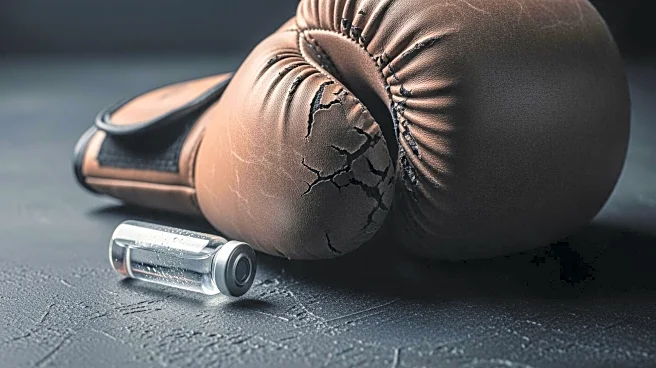What's Happening?
Joseph Parker, a former world heavyweight boxing champion from New Zealand, failed a drug test on the day of his defeat to British fighter Fabio Wardley. The bout, held at the O2 Arena in London on October
25, was to determine the WBO mandatory challenger to Oleksandr Usyk, the undisputed world champion. Queensberry Promotions announced that the Voluntary Anti-Doping Association reported an adverse finding from Parker's anti-doping test conducted on the day of the fight. Parker, who has a professional record of 36 wins and 4 losses, with 24 knockouts, has not commented publicly on the matter. The British Boxing Board of Control and the WBO have yet to respond to the situation.
Why It's Important?
The failed drug test could have significant implications for Joseph Parker's boxing career, potentially leading to a lengthy suspension. This development affects the competitive landscape of heavyweight boxing, particularly in relation to the WBO title contention. Parker's situation may influence the regulatory approach of boxing authorities towards doping violations, emphasizing the importance of maintaining integrity in the sport. The incident also highlights the ongoing challenges in ensuring fair competition and the role of anti-doping agencies in sports.
What's Next?
As the investigation into the failed drug test continues, the British Boxing Board of Control may impose sanctions on Parker, which could include a suspension from boxing. The WBO's response will be crucial in determining Parker's future opportunities in title contention. Stakeholders in the boxing community, including promoters and fellow fighters, will be closely monitoring the situation. The outcome may prompt discussions on enhancing anti-doping measures and policies within the sport.
Beyond the Headlines
This incident raises ethical questions about the use of performance-enhancing drugs in sports and the pressures athletes face to succeed. It may lead to broader conversations about the effectiveness of current anti-doping protocols and the need for stricter enforcement. The case also underscores the potential reputational damage athletes face when involved in doping scandals, affecting their legacy and marketability.









